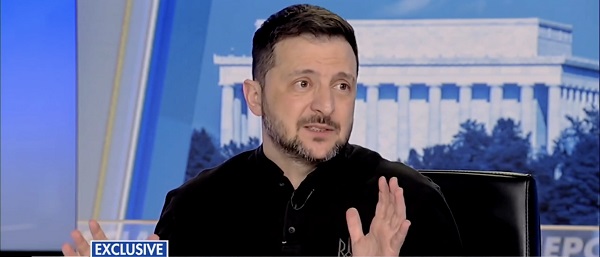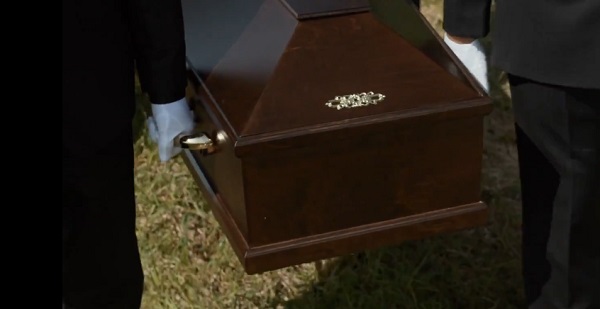Business
Zelenskyy Says He Still Wants To Sign Mineral Deal With US After Oval Office Spat With Trump


From the Daily Caller News Foundation
By
Ukrainian President Volodymyr Zelenskyy said Friday on Fox News that he still wants to sign the mineral deal with the United States despite his public blowup at the Oval Office.
During a gathering in the Oval Office on Friday with President Donald Trump, Vice President JD Vance, and other officials to discuss the U.S. deal with Ukraine over its minerals, Trump and Vance called out Zelenskyy’s behavior after he publicly criticized the U.S. for not attempting to halt Russia. Following the heated discussion, Zelenskyy appeared on “Special Report with Bret Baier” and told the host that he still believes the deal should be signed, adding he wanted to understand the security guarantees the U.S. would provide.
“United States wanted this deal very much, and we’ve been not against this deal, but we wanted to understand what parts in security guarantees will take this deal and what next steps. Just again, to understand for our people, during the war, what you don’t like, even sometimes hate? Surprises,” Zelenskyy said.
Dear Readers:
As a nonprofit, we are dependent on the generosity of our readers.
Please consider making a small donation of any amount here.
Thank you!
“It’s understandable. Many terrible things this war brought to us. So we don’t, we don’t want any surprises. Yes, that’s why we want to be very fair with our partners. I think this deal was prepared by teams. It was not simple during [the] weeks, and now it’s ready. I think that they have to sign. The countries have to sign. The ministers have to sign. That’s it. I don’t know when they will do it. It depends on the American side.”
Multiple sources on Tuesday said that the U.S. had struck a deal with Ukraine to jointly develop mineral extraction projects within the nation.
WATCH:
By Thursday, Trump’s Treasury Secretary Scott Bessent told Fox News that “the deal is done,” adding it was a “win-win” for all parties and would be signed by Friday at the White House. However, following Zelenskyy’s clash with the president and vice president, the White House told Daily Caller White House correspondent Reagan Reese that “nothing will be signed.”
Baier went on to ask Zelenskyy if the deal did not include security provisions, to which the Ukrainian president said that it was part of the “infrastructure.” Zelenskyy further said that Trump had said Russian President Vladimir Putin would not be able to enter certain mineral production territories. However, the Ukrainian president disagreed with the decision, saying he had told Trump not to “trust Putin.”
“I said to him that we had more than two, more than 20 companies, American companies, big companies on the territory of Ukraine. We had offices, even on temporarily occupied territories. For Putin, it doesn’t matter,” Zelenskyy said. “It’s a European company or Ukraine. It doesn’t matter. He just came and occupied it.”
“That’s what I said. I think this is a great idea [on] how to strengthen Ukraine and how to make business between two countries, how to make additional jobs for two countries. But it’s not just this will not save us,” Zelenskyy said.
After Zelenskyy left the White House, Trump took to Truth Social, posting that he had determined Zelenskyy is “not ready for Peace if America is involved, because he feels our involvement gives him a big advantage in negotiations.”
“I don’t want advantage, I want PEACE. He disrespected the United States of America in its cherished Oval Office. He can come back when he is ready for Peace,” Trump wrote.
Business
Liberal’s green spending putting Canada on a road to ruin

Once upon a time, Canadians were known for our prudence and good sense to such an extent that even our Liberal Party wore the mantle of fiscal responsibility.
Whatever else you might want to say about the party in the era of Jean Chrétien and Paul Martin, it recognized the country’s dire financial situation — back when The Wall Street Journal was referring to Canada as “an honorary member of the Third World” — as a national crisis.
And we (remember, I proudly served as Member of Parliament in that party for 18 years) made many hard decisions with an eye towards cutting spending, paying down the debt, and getting the country back on its feet.
Thankfully we succeeded.
Unfortunately, since then the party has been hijacked by a group of reckless leftwing fanatics — Justin Trudeau and his lackeys — who have spent the past several years feeding what we built into the woodchipper.
Mark Carney’s finally released budget is the perfect illustration of that.
The budget is a 400 page monument to deficit delusion that raises spending to $644.4 billion over five years — including $141.4 billion in new spending — while revenues limp to $583.3 billion, yielding a record (non-pandemic) $78.3 billion shortfall, an increase of 116% from last year.
This isn’t policy; it’s plunder. Interest payments alone devour $55.6 billion this year, projected to hit $76.1 billion by 2029-30 — more than the entire defence budget and rising faster than healthcare transfers.
We can’t discount the possibility that this will lead to a downgrade of our credit rating, which will significantly increase the cost of borrowing and of doing business more generally.
Numbers this big start to feel very abstract. But think of it this way: that is your money they’re spending. Ottawa’s wealth is made up entirely of our tax dollars. We’ve entrusted that money to them with the understanding that they will use it responsibly. In the decade these Liberals have been in power, they have betrayed that trust.
They’ve pursued policies which have made life in Canada increasingly unaffordable. For example, at the time of writing it takes 141 Canadian pennies (up from 139 a few days ago) to buy one U.S. dollar, in which all of our commodities are priced. Well, that’s .25 cents per litre of gasoline. Imagine what that’s going to do to the price of heating, of groceries, of the various other commodities which we consume.
And this budget demonstrates that the Carney era will be more of the same.
Of course, the Elbows Up crowd are saying the opposite — that this shows how fiscally responsible Mark Carney is, unlike his predecessor. (Never mind that they also publicly supported everything that Trudeau did when he was in government.) They claim that Carney shows that he’s more open to oil and gas than Trudeau was.
Don’t believe it.
The oil and gas sector does get a half-hearted nod in the budget with, for instance, a conditional pathway to repeal the emissions cap. But those conditions are important. Repeal is tied to the effectiveness of Carney’s beloved industrial carbon tax. If that newly super-charged carbon tax, which continues to make our lives more expensive, leads to government-set emissions reductions benchmarks being met, then Ottawa might — might — scrap the emissions.
Meanwhile, the budget doubles down on the Trudeau government’s methane emissions regulations. It merely loosens the provisions of the outrageous Bill C-59, an act which should have been scrapped in its entirety. And it leaves in place the Trudeaupian “green” super structure, which has resource sector investment, and any business that can manage it, fleeing to the U.S.
In these perilous times, with Canada teetering on the brink of recession, a responsible government would be cutting spending and getting out of the way of our most productive sectors, especially oil and gas — the backbone of our economy.
It would be repealing the BC tanker ban and Bill C-69, the “no more pipelines act,” so that our natural resources could better generate revenue on the international market and bring down energy rates at home.
It would quit wasting millions on Electric Vehicle charging stations; mandating that all Canadians buy EVs, even with their elevated cost; and pressuring automakers to manufacture Electric Vehicles, regardless of demand, and even as they keep closing up shop and heading south.
But in this budget the Liberals are going the opposite direction. Spend more. Tax more. Leave the basic Net-Zero framework in place. Rearrange the deck chairs on the Titanic.
They’re gambling tomorrow’s prosperity on yesterday’s green dogma, And every grocery run, every gas fill-up, every mortgage payment will serve as a daily reminder that we are the ones footing the bill.
Once upon a time, the Liberals knew better. We made the hard decisions and got the country back on its feet. Nowadays, not so much.
Business
Carney doubles down on NET ZERO

If you only listened to the mainstream media, you would think Justin Trudeau’s carbon tax is long gone. But the Liberal government’s latest budget actually doubled down on the industrial carbon tax.
While the consumer carbon tax may be paused, the industrial carbon tax punishes industry for “emitting” pollution. It’s only a matter of time before companies either pass the cost of the carbon tax to consumers or move to a country without a carbon tax.
Dan McTeague explains how Prime Minister Carney is doubling down on net zero scams.
-

 Health1 day ago
Health1 day agoLack of adequate health care pushing Canadians toward assisted suicide
-

 National1 day ago
National1 day agoWatchdog Demands Answers as MP Chris d’Entremont Crosses Floor
-

 Alberta1 day ago
Alberta1 day agoATA Collect $72 Million in Dues But Couldn’t Pay Striking Teachers a Dime
-

 Artificial Intelligence1 day ago
Artificial Intelligence1 day agoAI seems fairly impressed by Pierre Poilievre’s ability to communicate
-

 Media1 day ago
Media1 day agoBreaking News: the public actually expects journalists to determine the truth of statements they report
-

 Artificial Intelligence1 day ago
Artificial Intelligence1 day agoAI Faces Energy Problem With Only One Solution, Oil and Gas
-

 Business22 hours ago
Business22 hours agoLiberal’s green spending putting Canada on a road to ruin
-

 Business23 hours ago
Business23 hours agoCarney doubles down on NET ZERO











